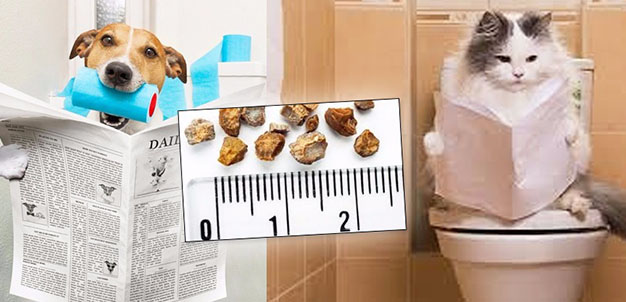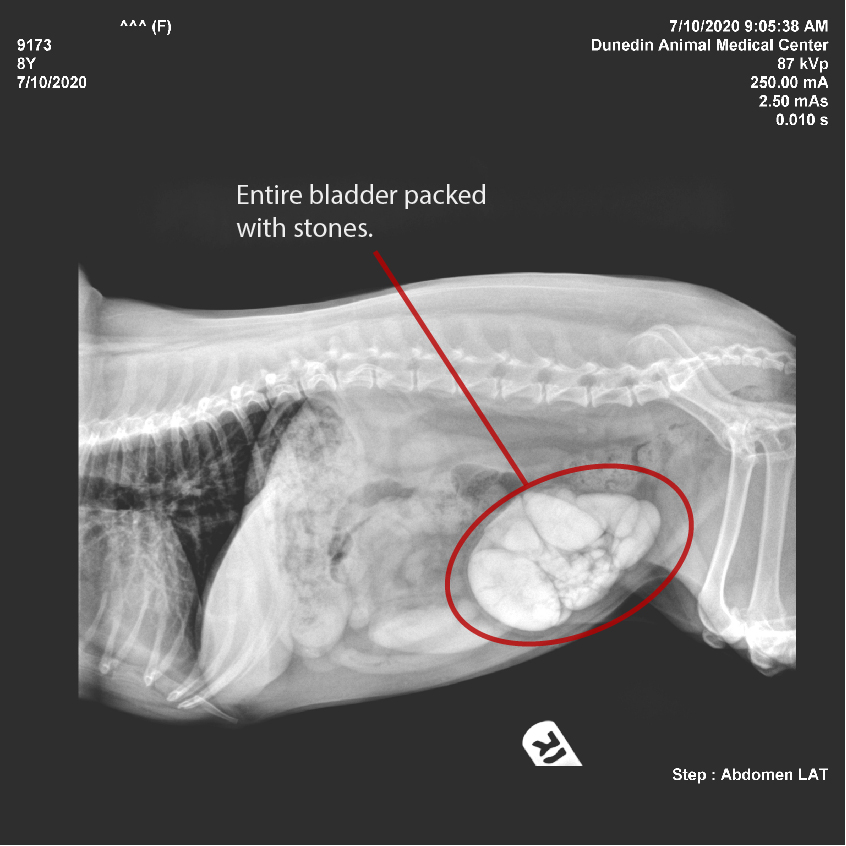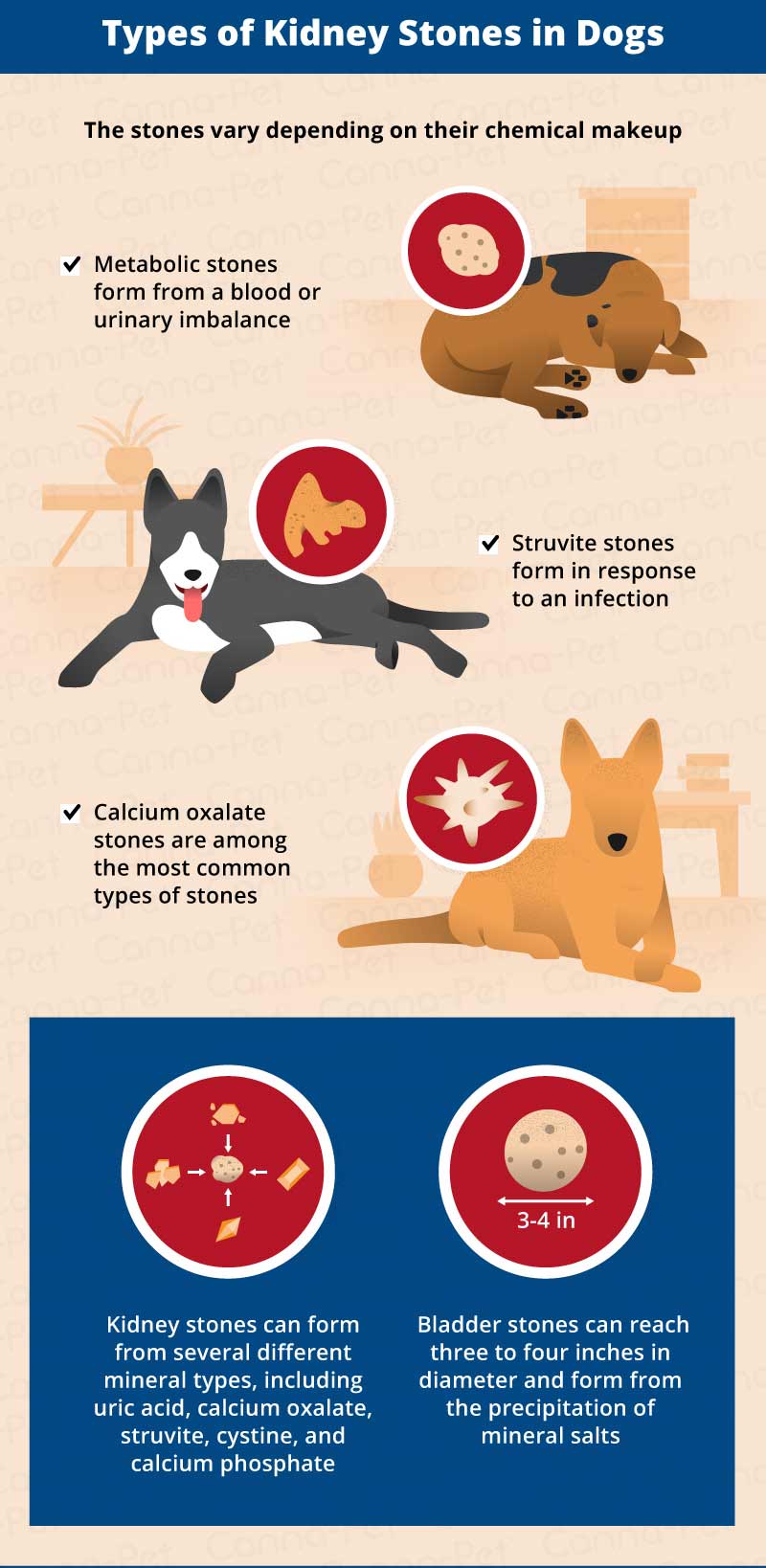Free Shipping On All Orders Over $150.
Causes and Treatment for Kidney Stones in Dogs
Kidney stones in dogs can be a painful and distressing condition that affects the overall health of our beloved pets. Just like humans, dogs can suffer from kidney stones, which can lead to serious complications if left untreated. This article explores the various aspects of kidney stones in dogs, including symptoms, causes, treatments, and prevention strategies, offering a comprehensive guide for dog owners to ensure their furry friends maintain optimal kidney health.
Kidney stones in dogs

Kidney stones, also referred to as uroliths or calculi, are solid formations that develop in the urinary tract of dogs, often resulting in significant discomfort and health issues. These stones can vary in size, shape, and composition, and may occur in different parts of the urinary system, such as the kidneys, ureters, bladder, or urethra.
The formation of kidney stones is primarily attributed to an imbalance of minerals and nutrients in your dog's diet, along with certain genetic predispositions. The presence of these stones can obstruct the normal flow of urine, leading to urinary blockages, infections, or damage to the urinary tract. Recognizing the signs and symptoms early is crucial for effective treatment and ongoing management of your dog’s kidney health.
In understanding kidney stones in dogs, it's essential to acknowledge that this condition could be symptomatic of broader dog urinary problems, indicating underlying issues related to hydration levels, dietary factors, or even behavioral tendencies. It becomes crucial for pet owners to actively monitor their dogs for any changes in behavior or habits that could indicate the onset of this troubling condition.
Types of kidney stones in dogs
There are several types of kidney stones that can form in dogs, each arising from different mineral compositions:
- Struvite stones: Often associated with urinary tract infections, struvite stones are more common in female dogs and are typically formed by magnesium ammonium phosphate crystals.
- Calcium oxalate stones: These stones are formed when there's an excess of calcium in the dog’s urine. Certain breeds, like Dalmatians, are genetically predisposed to developing these stones.
- Urate stones: Usually seen in dogs with liver disease or certain genetic conditions, urate stones can arise from high levels of uric acid in the urine.
- Cystine stones: These rare stones form due to a genetic defect in the renal tubules, causing an abnormal amount of cystine to be excreted in the urine.
Understanding the type of kidney stone affecting your dog is essential for determining the appropriate course of treatment and prevention strategies.
Dog kidney stone symptoms

Recognizing the symptoms of kidney stones in dogs is vital for timely intervention. While some dogs may not show noticeable signs initially, others may experience various distress signals that require immediate veterinary attention.
Common indicators of kidney stones
- Hematuria (blood in urine): One of the most alarming signs is the presence of blood in your dog's urine, which may appear pink, red, or brownish. This symptom can cause considerable anxiety for pet owners, highlighting the importance of prompt veterinary evaluation.
- Frequent urination: Dogs suffering from kidney stones may exhibit increased frequency of urination, often straining to do so. This condition, known as pollakiuria, can be distressing for both the dog and owner, as it disrupts normal behavior.
- Painful urination: If your dog seems to be in pain while urinating, they may display signs of discomfort or whimpering. This condition, known as dysuria, is a clear indication that something may be amiss within the urinary tract.
- Vomiting and lethargy: In more severe cases, dogs may exhibit vomiting, loss of appetite, and general lethargy due to the discomfort caused by the stones. These symptoms can also signal the buildup of toxins in the bloodstream, necessitating urgent medical care.
Behavioral changes
Changes in behavior can also serve as warning signs of kidney stones in dogs. Pet owners should observe if their dog becomes more irritable or withdrawn than usual. Dogs that normally enjoy playtime might become disinterested or refuse to engage in their favorite activities. An uncharacteristic change in mood or energy levels can often indicate discomfort or pain, prompting further investigation into potential health issues.
Being vigilant and monitoring for these dog kidney stone symptoms can make a significant difference in a dog's recovery and long-term health.
Dog urinary problems

Dog urinary problems encompass a range of conditions that affect a dog’s ability to urinate comfortably and effectively. When kidney stones are present, they can exacerbate existing urinary issues or create new ones that complicate your dog’s health.
Common urinary problems in dogs
- Urinary tract infections (UTIs): Often accompanied by inflammation, UTIs can result in increased frequency of urination and discomfort. Struvite stones, in particular, often arise due to underlying infections, creating a vicious cycle of urinary issues.
- Incontinence: Some dogs may experience incontinence as a result of bladder stones or other urinary disorders. This involuntary loss of control over urination can be frustrating for both dogs and their owners, and it may require specialized treatment options.
- Bladder control issues: Weakness in bladder muscles can lead to difficulty in completely emptying the bladder, increasing the risk of urinary retention and subsequent infections or complications.
Diagnostic approaches for urinary problems
If you suspect your dog has urinary problems, consulting a veterinarian is essential. A thorough examination, including urinalysis, ultrasound, or X-rays, can help identify the specific issues at hand. Early diagnosis allows for proactive measures to manage and treat urinary concerns before they escalate into more pressing health threats.
Veterinarians may also recommend lifestyle changes, including modifications to exercise routines or adjustments in feeding practices, to promote better urinary health. Understanding your dog's unique needs will enable you to create a healthier environment that minimizes the risk of recurrent kidney stones and dog urinary problems.
Canine kidney health

Maintaining optimal canine kidney health is vital for the overall well-being of your dog. Healthy kidneys play a key role in filtering waste products from the blood, regulating fluid balance, and maintaining electrolyte levels.
Importance of proper hydration
One of the fundamental components of canine kidney health is ensuring your dog remains adequately hydrated. Dehydration can lead to concentrated urine, making it more likely for minerals to crystallize and form stones. Encouraging regular water intake can mitigate this risk.
Providing access to fresh water at all times is essential, and pet owners may need to explore creative ways to increase fluid consumption. For example, incorporating wet food into your dog’s diet or adding water to dry kibble can help boost hydration levels.
Understanding dietary impacts
A balanced diet is critical for supporting healthy kidney function. Diets that contain excessive levels of protein, calcium, or certain minerals can contribute to stone formation. Monitoring your dog’s nutritional intake and consulting with a veterinarian about dietary adjustments can significantly impact kidney health.
Additionally, selecting high-quality dog food formulated to support urinary health can help prevent the development of kidney stones and urinary tract infections. Researching and investing in premium diets designed specifically for canine kidney health can pay dividends in the long run.
Regular veterinary check-ups
Routine veterinary visits are an integral aspect of maintaining canine kidney health. Annual wellness exams allow veterinarians to assess your dog’s overall condition, perform necessary diagnostic tests, and identify any potential health concerns early on. Engaging in preventive care ensures that any issues are addressed promptly, leading to better outcomes for your furry friend.
Dog bladder stones

Bladder stones, or uroliths, are a specific type of stone that forms within the bladder rather than the kidneys but can have similar implications for a dog's health. These stones can lead to obstruction of the urinary tract, pain, and discomfort.
Different types of bladder stones
Similar to kidney stones, bladder stones come in various types based on their mineral composition. Struvite and calcium oxalate stones are among the most prevalent kinds found in canine patients. Each type requires distinct treatment approaches, making it crucial for dog owners to work closely with their veterinarians for accurate diagnosis and management.
- Struvite bladder stones: Often associated with urinary tract infections, these stones can form when bacteria produce enzymes that alter the urine's pH level, allowing for stone formation.
- Calcium oxalate bladder stones: These stones tend to form in acidic urine and are commonly seen in certain breeds predisposed to stone formation.
Symptoms of bladder stones
Dogs with bladder stones may exhibit various symptoms similar to those associated with kidney stones, including:
- Frequent urination
- Painful urination
- Blood in urine
- Lethargy or decreased activity levels
Being aware of these signs can facilitate early detection and prompt veterinary care, minimizing the risk of complications associated with dog bladder stones.
Treatment options
Treatment methods for bladder stones depend on factors such as the stone composition, size, and the overall health of the dog. Options may include:
- Surgical removal: In cases where stones are particularly large or obstructive, surgical intervention may be necessary to remove them from the bladder.
- Medications: Veterinarians may prescribe medications to dissolve certain types of stones or to manage symptoms, such as pain relief during urination.
- Dietary changes: Adjusting your dog’s diet to include foods formulated for urinary health can help prevent recurrence of bladder stones and support overall bladder function.
Working collaboratively with your veterinarian ensures that effective treatment plans are established, tailored to your dog’s specific needs and circumstances.
Kidney stone treatment for dogs

When diagnosed with kidney stones, prompt and appropriate treatment is essential for alleviating discomfort and preventing complications. Various treatment options exist depending on factors such as the severity of the case, type of stones, and the overall health of the dog.
Surgical intervention
In many instances, surgery may be the most effective method for removing kidney stones, especially when they are large or obstructive.
- Open surgery: This traditional approach involves creating an incision in the abdomen to access the kidneys. It is often used for larger stones that cannot pass through the urinary tract on their own.
- Minimally invasive techniques: Advances in veterinary medicine have led to the development of less invasive procedures, such as laparoscopic surgery, which may result in shorter recovery times and reduced post-operative pain.
Regardless of the surgical approach used, most dogs require hospitalization for close monitoring and recovery following the procedure.
Non-surgical treatments
For smaller stones or less severe cases, non-surgical treatments may be adopted. These options include:
- Medication: Depending on the type of kidney stones, your veterinarian may prescribe medications to help dissolve them or manage accompanying symptoms. However, not all stones can be dissolved with medication alone.
- Dietary modifications: Adjusting your dog’s diet to lower the incidence of stone formation could prevent further development. Specific prescription diets are available that target different types of stones, aiding in prevention.
Rehabilitation and follow-up care
Post-treatment care is crucial for a successful recovery. Following surgery, dogs may need to be monitored for complications, such as infection or persistent urinary issues.
- Hydration and nutrition: Encouraging your dog to drink plenty of water and adhering to a prescribed diet can greatly enhance recovery efforts and prevent future occurrences of kidney stones.
- Regular veterinary check-ups: Scheduling follow-up appointments allows veterinarians to monitor your dog’s progress, assessing kidney function and identifying potential issues early on.
Effective kidney stone treatment for dogs not only addresses existing stones but also focuses on preventive care to improve long-term health outcomes.
Causes of kidney stones in dogs

Understanding the causes of kidney stones in dogs is vital for prevention and effective treatment. Various factors contribute to the development of these painful stones, and recognizing these elements can help pet owners take proactive measures.
Dietary factors
The composition of a dog’s diet plays a significant role in stone formation. High levels of certain minerals, such as calcium, phosphorus, and protein, can lead to elevated concentrations in urine, promoting crystallization and stone growth.
- Overfeeding: Excessive portions or improper feeding schedules can lead to obesity, exacerbating kidney health issues and increasing the likelihood of stone formation.
- High-protein diets: Diets rich in protein can elevate calcium levels in urine, particularly in susceptible breeds. Monitoring and modifying your dog's nutritional content according to veterinary recommendations can reduce risks.
Genetics and breed predisposition
Certain dog breeds are genetically predisposed to developing kidney stones, making it essential to remain vigilant about urinary health. Breeds such as Dalmatians, Yorkshire Terriers, and Miniature Schnauzers are more likely to experience urinary tract problems and subsequent stone formation.
Environmental factors
Environmental influences can also contribute to kidney stone development. Factors such as:
- Dehydration
- Lack of access to clean water
- Heat stress
These variables can elevate the concentration of minerals in urine, promoting stone formation. Being mindful of your dog's environment and ensuring access to hydration can play a pivotal role in preventing kidney stones.
By understanding the causes of kidney stones in dogs, you empower yourself to implement preventative measures that safeguard your pet's health and well-being.
Preventing kidney stones in dogs

Preventive care is the cornerstone of ensuring your dog remains free from kidney stones and the associated complications. Implementing effective strategies can significantly reduce the likelihood of your furry friend experiencing this painful condition.
Hydration and diet
Maintaining adequate hydration is one of the most effective methods for preventing kidney stones. Ensuring your dog drinks enough water helps dilute urine, decreasing the risk of mineral crystallization.
- Encouraging water intake: Providing fresh water at all times, using water fountains, or adding wet food to your dog's diet can stimulate higher fluid consumption.
- Choosing the right diet: Opt for high-quality dog food that meets your dog’s nutritional needs while being low in problem-causing minerals. Consulting with your veterinarian regarding the best diet for your dog is essential for preventing kidney stones.
Regular exercise
Physical activity is integral not just for overall health but also for encouraging normal urination patterns. Regular walks and playtime help stimulate the bladder, reducing the risk of urinary stasis, which contributes to stone formation.
Routine vet check-ups
Scheduling regular veterinary visits allows you to stay informed about your dog's health status. Early detection of potential issues ensures timely intervention, minimizing the risk of kidney stones and related complications.
- Diagnostic testing: Periodic urinalysis or blood tests can provide insights into your dog's kidney function and reveal any abnormalities before they escalate into serious problems.
By prioritizing these preventive strategies, you can significantly decrease the chances of your dog developing kidney stones and promote a healthier lifestyle.
Dog urinary tract infection
While urinary tract infections (UTIs) can occur independently, they often have strong ties to kidney stones and other urinary tract issues in dogs. Understanding the relationship between these two conditions is crucial for effective management and prevention.
Symptoms and diagnosis
Symptoms of UTIs in dogs may overlap with those of kidney stones, making it important for pet owners to recognize the signs:
- Frequent urination
- Straining or discomfort during urination
- Unusual odor in the urine
- Lethargy or loss of appetite
Veterinary diagnosis usually involves a urinalysis, where bacteria, white blood cells, and other anomalies can indicate an infection.
Connection to kidney stones
UTIs can both exacerbate and be exacerbated by kidney stones. Struvite stones, for instance, often result from chronic UTIs, where bacteria produce enzymes leading to alkaline urine that fosters stone formation.
Conversely, kidney stones can irritate the bladder lining, increasing susceptibility to infections. Consequently, addressing one condition often necessitates consideration of the other to achieve comprehensive treatment.
Treatment and management
Treating UTIs typically involves antibiotic therapy, while addressing underlying issues such as kidney stones may require additional interventions.
- Antibiotic treatment: Veterinarians may prescribe antibiotics to eliminate the infection and alleviate symptoms, ensuring your dog feels more comfortable.
- Preventing recurrent infections: Addressing dietary and lifestyle factors, such as hydration and regular bathroom breaks, can minimize the risk of future UTIs and their association with kidney stones.
Close collaboration with your veterinarian enables you to establish a holistic treatment plan that encompasses both kidney stones and urinary tract infections, promoting long-term health for your canine companion.
Best diet for dogs with kidney stones
Dietary considerations play a crucial role in both managing existing kidney stones and preventing their formation in the future. The best diet for dogs with kidney stones varies based on the type of stones present; thus, working with your veterinarian to tailor a suitable meal plan is essential.
Key dietary components
A well-balanced diet for dogs with kidney stones typically includes the following components:
- Low protein: Diets lower in protein can reduce the strain on the kidneys and help prevent the formation of stones, particularly in sensitive breeds.
- Balanced minerals: Formulations with carefully calculated diets minimize excessive calcium, phosphorus, and other minerals that contribute to stone formation.
- Increased moisture content: Incorporating wet food and ensuring access to plenty of water can help keep your dog hydrated, further diluting urine and reducing the risk of crystallization.
Recommended formulations
Many commercial dog foods are specifically designed for dogs prone to kidney stones or urinary tract issues. Prescription diets often provide targeted nutritional support to address these conditions while helping prevent future occurrences.
Consulting with your veterinarian about the best diet for your dog is imperative, as individual nutritional needs can vary based on age, breed, weight, and health status.
Making gradual changes
When transitioning to a new diet, it's important to do so gradually to avoid gastrointestinal upset. Introducing new foods slowly over several days allows your dog to acclimate to the changes without adverse reactions.
By focusing on a balanced diet tailored to your dog’s specific needs, you can foster improved kidney health and work towards preventing the recurrence of kidney stones or urinary tract issues.
Conclusion
In conclusion, understanding and managing kidney stones in dogs is a fundamental aspect of responsible pet ownership. By familiarizing yourself with the symptoms, causes, and treatment options surrounding this condition, you can take proactive steps to support your dog's urinary and kidney health. Awareness, early diagnosis, and tailored dietary choices contribute significantly to preventing the formation of kidney stones and enhancing the quality of life for your furry companions. With diligent care and regular veterinary check-ups, you can pave the way for a healthier, happier future for your cherished pets.
0 comment
Be the first to comment